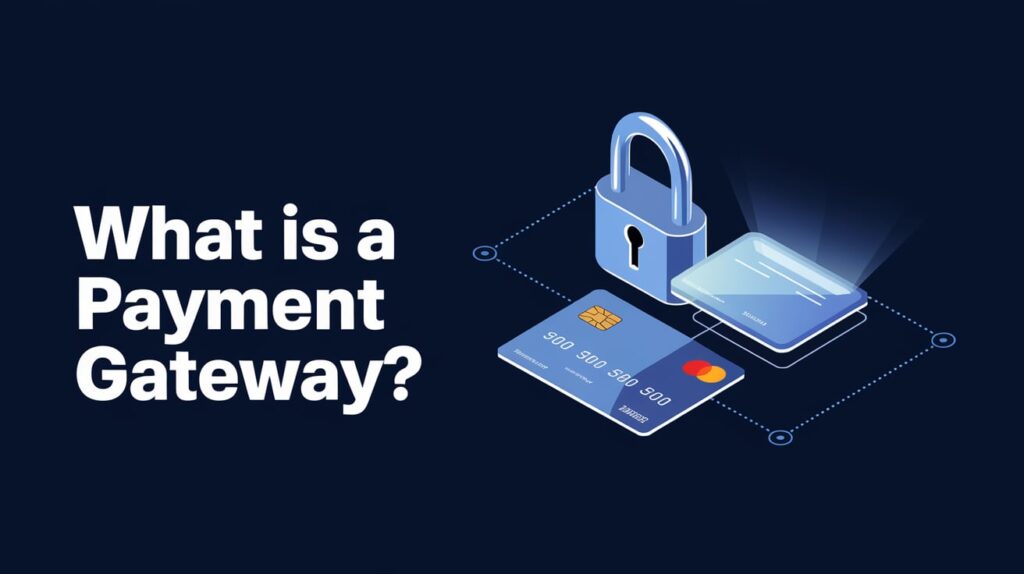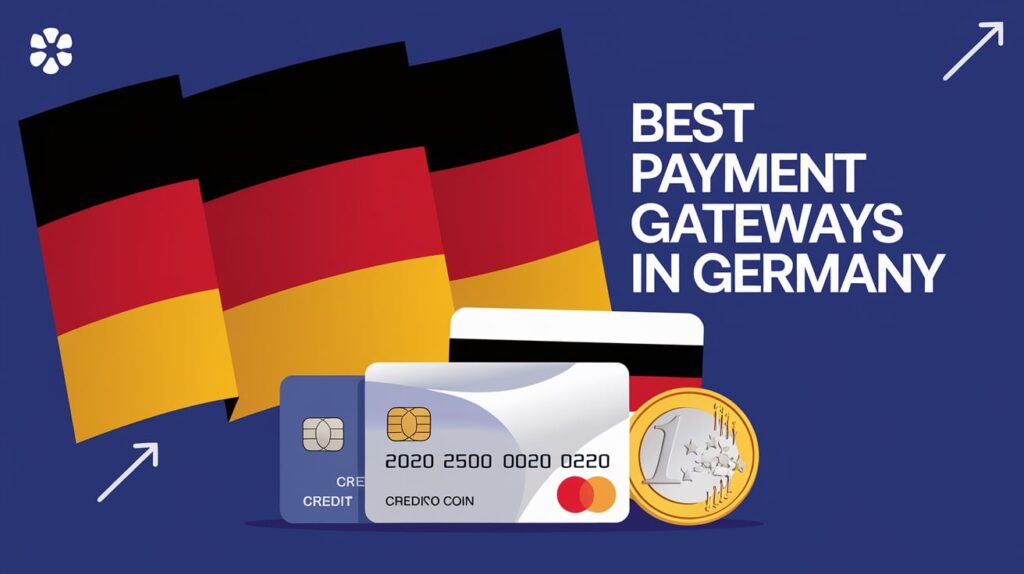Are you looking for the Best Payment Gateways in Germany? If yes, then this article is for you.
Businesses need secure and reliable ways to accept payments, especially in e-commerce. Germany, one of Europe’s largest online markets, requires versatile payment solutions that meet the needs of both businesses and customers. Whether you run a small business, startup, or large company, choosing the right payment gateway is essential for ensuring smooth transactions and customer satisfaction.
In this article, we’ll look at the top payment gateways in Germany and provide tips on selecting the best one for your business.
What is a Payment Gateway?

A payment gateway is a technology that enables online businesses to accept payments from customers. It acts as the intermediary between the merchant’s website and the financial institution, ensuring that payment data is securely transmitted for approval and processing. The gateway encrypts sensitive payment details, such as credit card information, to protect both the business and the customer from fraud.
How Does a Payment Gateway Work?
A payment gateway follows a series of steps to process payments:
- Customer Initiates Payment: When a customer selects a product or service on a website and proceeds to the checkout, they enter their payment details.
- Encryption of Payment Data: The payment gateway encrypts the customer’s payment details (credit card number, CVV, etc.) and sends it securely to the acquiring bank.
- Transaction Authorization: The acquiring bank forwards the information to the customer’s issuing bank (the bank that issued the credit card) for approval or decline.
- Approval/Decline: The issuing bank checks the available funds and security factors and sends a response (approval or decline) back to the acquiring bank.
- Finalization: The payment gateway then forwards the response to the merchant’s website, completing the transaction.
- Settlement: If approved, the funds are transferred from the customer’s bank account to the merchant’s bank account.
Also, Read: Top 10 Best Payment Gateways in the USA
Why Do You Need Payment Gateways in Germany?
Germany is one of the most important e-commerce hubs in Europe, with millions of online shoppers and a growing number of digital services. Offering secure, user-friendly payment options is crucial for building trust with customers and ensuring the success of online businesses. German consumers prefer payment methods that are secure, fast, and reliable, which makes integrating a robust payment gateway a necessity for businesses.
Current Payment Solution Landscape in Germany
Germany has a diverse payment solution landscape, with options ranging from traditional bank transfers to digital wallets. The German market is unique because of its high adoption of alternative payment methods like SEPA (Single Euro Payments Area) direct debit, SOFORT, and open invoices. Debit and credit cards, though common, are not as dominant as in other markets like the U.S. Additionally, Germans value security and privacy, which makes trust in the payment gateway a critical factor in choosing the right solution.
5 Top Payment Methods in Germany
- SOFORT Banking: A direct payment method that allows customers to complete transactions via their online banking credentials.
- SEPA Direct Debit: A widely used method for recurring payments, such as subscriptions, allowing businesses to directly debit customer accounts.
- PayPal: One of the most popular payment services, offering convenience and buyer protection.
- Giropay: An online payment method that works with the majority of German banks, offering a secure connection between banks and e-commerce platforms.
- Credit and Debit Cards: Although not the most popular, Visa, Mastercard, and other card networks are still frequently used.
Also, See: Top 10 Best Payment Gateways in Ireland
Why Should E-Commerce Businesses Choose the Right Online Payment Methods?
Selecting the right payment method ensures a seamless customer experience, which is crucial for reducing cart abandonment rates and increasing conversions. German consumers have a strong preference for secure, familiar payment methods. If a business fails to offer the preferred payment options, it risks losing potential customers. Choosing the right payment gateway can also reduce processing fees, speed up transaction times, and provide valuable data insights.
Top 10 Best Payment Gateways in Germany
Here are the list of top 10 best payment gateways in Germany
1. PayPal
PayPal is one of the most widely used payment gateways globally. Known for its simplicity, it allows users to pay with their PayPal balance, linked bank account, or credit cards. In Germany, PayPal is highly popular, offering convenience and security for both buyers and merchants.
Pros:
- Global Reach: Accepted in over 200 countries, supporting 25 currencies.
- Buyer Protection: PayPal’s buyer protection policies make it a trusted choice for consumers.
- Ease of Use: Quick setup and integration with many e-commerce platforms.
Cons:
- High Fees: Transaction fees can be steep, especially for international payments.
- Disputes and Holds: PayPal is known for freezing accounts during disputes, which can disrupt business cash flow.
2. Stripe
Stripe is a developer-friendly payment gateway offering a robust API that allows businesses to build customized payment solutions. It supports a wide range of payment methods, including credit cards, direct debits, and mobile wallets, making it ideal for tech-savvy e-commerce businesses.
Pros:
- Customizable: Highly flexible with a strong API for tailored payment solutions.
- International Support: Allows businesses to accept payments from over 135 currencies.
- Transparent Pricing: No hidden fees and straightforward pricing structure.
Cons:
- Complex Setup: Requires developer skills to fully utilize the platform’s customization options.
- Limited Support: Customer service can sometimes be slow in responding to issues.
3. SOFORT Banking
SOFORT is a direct bank transfer system widely used in Germany and Europe. It allows customers to pay for online purchases using their bank login details, which are verified in real-time. It’s known for its speed and security, offering a seamless payment experience.
Pros:
- Popular in Germany: Widely trusted and preferred by German consumers.
- Secure: Offers a high level of security with real-time verification.
- No Registration Required: Customers can pay directly using their bank accounts without creating additional accounts.
Cons:
- Limited International Reach: SOFORT is primarily used in Germany and a few other European countries.
- Not Ideal for Recurring Payments: Limited functionality for handling subscription-based or recurring payments.
4. Klarna
Klarna is a Swedish-based payment gateway that offers a variety of payment options, including “pay later” and installment plans, which are particularly popular in Germany. Klarna allows businesses to offer flexible payments, boosting customer convenience.
Pros:
- Flexible Payment Options: Offers “buy now, pay later,” installments, and direct payments, giving customers flexibility.
- Consumer Trust: Klarna is well-known and trusted, especially for larger purchases.
- Boosts Conversion Rates: The flexibility of payment options helps reduce cart abandonment.
Cons:
- Higher Fees for Merchants: Klarna’s convenience comes with higher transaction fees compared to other gateways.
- Complicated Integration: Some merchants report that integrating Klarna with their e-commerce systems can be tricky.
5. Mollie
Mollie is a payment gateway that focuses on simplicity and transparency. It’s designed for small and medium-sized businesses, offering an easy-to-use interface and support for various payment methods, including SEPA, SOFORT, PayPal, and credit cards.
Pros:
- Transparent Pricing: No hidden fees; businesses only pay for successful transactions.
- Easy Integration: Mollie offers plugins for major e-commerce platforms, making setup simple.
- Supports Multiple Payment Methods: Including local German methods like SEPA Direct Debit.
Cons:
- Limited Features for Large Businesses: Mollie is ideal for SMEs but may lack advanced features needed by larger enterprises.
- No Invoicing Features: Businesses need a separate system to handle invoicing.
6. Adyen
Adyen is a global payment gateway used by some of the world’s biggest companies, such as Uber and Spotify. It supports a wide variety of payment methods, including local ones like SEPA and SOFORT, making it a top choice for businesses operating in Germany.
Pros:
- Scalability: Adyen is suitable for businesses of all sizes, from startups to large enterprises.
- Comprehensive Reporting: Offers detailed analytics and reporting tools to monitor transactions.
- Supports Many Payment Methods: Local and international payment options, including digital wallets.
Cons:
- Higher Costs: Adyen’s fees can be higher compared to smaller, more localized gateways.
- Complex to Implement: Adyen’s wide array of features can make integration more complex.
7. Giropay
Giropay is an online payment method that works directly with German banks. It allows customers to make real-time payments through their existing online banking accounts, ensuring fast and secure transactions. It’s widely used in Germany for e-commerce and utility payments.
Pros:
- Bank-Backed Security: Direct integration with German banks ensures a high level of trust and security.
- Real-Time Payments: Instant payments improve cash flow for businesses.
- No Credit Cards Needed: Customers can pay directly from their bank account, which is preferred by many Germans.
Cons:
- Limited Reach: Only available to customers with German bank accounts.
- Not Ideal for International Payments: Mainly focused on the German market.
8. Wirecard (Now Defunct but Elements Still in Use)
Wirecard was once a major player in the German payment gateway market before its collapse in 2020. However, some of its technology and infrastructure are still in use by other providers. Wirecard offered a broad range of payment options and was integrated with many e-commerce platforms before its downfall.
Pros:
- Advanced Technology: Wirecard had cutting-edge solutions for payment processing.
- International Capabilities: Supported a wide range of currencies and payment methods.
Cons:
- Defunct Company: While some of its systems are still in use, the company no longer operates, so direct support is unavailable.
- Trust Issues: The company’s collapse shook consumer and business trust.
9. Amazon Pay
Amazon Pay allows customers to use their Amazon credentials to pay for purchases on third-party websites. It’s a trusted payment method, especially for those who frequently shop on Amazon, and offers seamless integration with e-commerce platforms.
Pros:
- Trusted Brand: Customers feel secure using Amazon Pay due to their familiarity with Amazon.
- Easy Checkout: Customers don’t need to re-enter their payment details, speeding up the checkout process.
- International Reach: Amazon Pay supports multiple currencies and countries.
Cons:
- Limited Features for Merchants: It lacks some of the advanced features found in dedicated payment gateways.
- Higher Fees: Compared to other options, Amazon Pay can be more expensive for merchants.
10. Authorize.Net
Authorize.Net is a long-standing payment gateway known for its strong fraud prevention tools and wide range of payment options. It’s a global solution that integrates well with many e-commerce platforms, making it a solid choice for German businesses with international operations.
Pros:
- Robust Fraud Prevention: Advanced security features help protect businesses from fraudulent transactions.
- Wide Payment Support: Supports credit cards, e-checks, digital payments, and more.
- 24/7 Customer Support: Known for excellent customer service, available around the clock.
Cons:
- High Setup and Maintenance Fees: Authorize.Net can be costly to implement for smaller businesses.
- Complicated for Small Businesses: Its extensive features may be overwhelming for smaller companies.
Criteria to Look Out for Payment Gateways in Germany
When choosing a payment gateway in Germany, consider the following factors:
- Security and Compliance: Ensure that the gateway complies with PCI DSS (Payment Card Industry Data Security Standard) and offers robust encryption.
- Local Payment Options: It should support popular German payment methods like SEPA, SOFORT, and Giropay.
- Transaction Fees: Compare fees for transaction processing, setup, and maintenance.
- Ease of Integration: Choose a gateway that integrates easily with your existing e-commerce platform.
- Customer Support: Reliable and responsive customer service is crucial, especially when dealing with payment-related issues.
- User Experience: The gateway should offer a smooth and fast checkout experience, reducing cart abandonment rates.
Pros and Cons of the Best Payment Gateways in Germany
Pros of Using Payment Gateways in Germany
- Security and Trust: High consumer trust and strong security standards (PCI DSS compliance).
- Local Payment Options: Supports popular local methods like PayPal, Klarna, Sofort, and SEPA, increasing conversion rates.
- Convenience: Smooth checkout and multiple currency/language options for international sales.
- Efficiency: Automates transactions, offers reporting tools, and ensures tax compliance.
- EU Compliance: Meets EU financial regulations (e.g., PSD2, GDPR), ensuring legal protection.
Cons of Using Payment Gateways in Germany
- Transaction Fees: High fees for each transaction and currency conversion.
- Limited Global Reach: Some local methods (e.g., Sofort) may not be widely accepted outside Europe.
- Integration Complexity: Setup can be complex, and APIs may have limitations.
- Payment Delays: Bank transfers or direct debit can delay payment processing.
- Regulatory Complexity: Constantly evolving laws (e.g., VAT, GDPR) require ongoing attention.
- Third-Party Dependency: Risk of outages and limited customization options for some gateways.
FAQs
What are the most popular payment gateways in Germany?
PayPal, Stripe, SOFORT, Klarna, and Giropay are among the most popular payment gateways in Germany.
Is it safe to use payment gateways in Germany?
Yes, as long as the gateway complies with PCI DSS standards and uses encryption to protect customer data.
Which payment method is most preferred by German consumers?
SOFORT and SEPA Direct Debit are highly preferred, followed by PayPal and credit cards.
What fees should I expect when using a payment gateway in Germany?
Fees vary, but typically include a transaction fee (percentage of the sale) and possibly setup or monthly fees depending on the gateway.
Conclusion
Choosing the right payment gateway in Germany is crucial for the success of any e-commerce business. By offering trusted, secure, and user-friendly payment options, you can cater to customer preferences, increase trust, and boost sales. With options like PayPal, Stripe, SOFORT, and Klarna, businesses have a variety of reliable payment gateways to choose from. Be sure to consider factors such as security, transaction fees, and ease of integration when making your decision.

